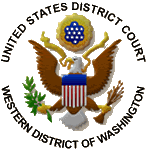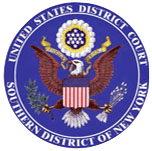Grokster Ltd. was a privately owned software company based in Nevis, West Indies that created the Grokster peer-to-peer file-sharing client in 2001 that used the FastTrack protocol. Grokster Ltd. was rendered extinct in late 2005 by the United States Supreme Court's decision in MGM Studios, Inc. v. Grokster, Ltd. The court ruled against Grokster's peer-to-peer file sharing program for computers running the Microsoft Windows operating system, effectively forcing the company to cease operations.
BitTorrent is a communication protocol for peer-to-peer file sharing (P2P), which enables users to distribute data and electronic files over the Internet in a decentralized manner.
A&M Records, Inc. v. Napster, Inc., 239 F.3d 1004 (2001) was a landmark intellectual property case in which the United States Court of Appeals for the Ninth Circuit affirmed the ruling of the United States District Court for the Northern District of California, holding that defendant, peer-to-peer (P2P) file-sharing service Napster, could be held liable for contributory infringement and vicarious infringement of the plaintiffs' copyrights. This was the first major case to address the application of copyright laws to peer-to-peer file sharing.
A BitTorrent tracker is a special type of server that assists in the communication between peers using the BitTorrent protocol.
File sharing in Canada relates to the distribution of digital media in that country. Canada had the greatest number of file sharers by percentage of population in the world according to a 2004 report by the OECD. In 2009 however it was found that Canada had only the tenth greatest number of copyright infringements in the world according to a report by BayTSP, a U.S. anti-piracy company.
Arts and media industry trade groups, such as the International Federation of the Phonographic Industry (IFPI) and Motion Picture Association of America (MPAA), strongly oppose and attempt to prevent copyright infringement through file sharing. The organizations particularly target the distribution of files via the Internet using peer-to-peer software. Efforts by trade groups to curb such infringement have been unsuccessful with chronic, widespread and rampant infringement continuing largely unabated.
File sharing is the practice of distributing or providing access to digital media, such as computer programs, multimedia, program files, documents or electronic books/magazines. It involves various legal aspects as it is often used to exchange data that is copyrighted or licensed.

The use of the BitTorrent protocol for sharing of copyrighted content generated a variety of novel legal issues. While the technology and related platforms are legal in many jurisdictions, law enforcement and prosecutorial agencies are attempting to address this avenue of copyright infringement. Notably, the use of BitTorrent in connection with copyrighted material may make the issuers of the BitTorrent file, link or metadata liable as an infringing party under some copyright laws. Similarly, the use of BitTorrent to procure illegal materials could potentially create liability for end users as an accomplice.
Capitol Records, Inc. v. Thomas-Rasset was the first file-sharing copyright infringement lawsuit in the United States brought by major record labels to be tried before a jury. The defendant, Jammie Thomas-Rasset, was found liable to the plaintiff record company for making 24 songs available to the public for free on the Kazaa file sharing service and ordered to pay $220,000.
A Doe subpoena is a subpoena that seeks the identity of an unknown defendant to a lawsuit. Most jurisdictions permit a plaintiff who does not yet know a defendant's identity to file suit against John Doe and then use the tools of the discovery process to seek the defendant's true name. A Doe subpoena is often served on an online service provider or ISP for the purpose of identifying the author of an anonymous post.
In the BitTorrent file distribution system, a torrent file or meta-info file is a computer file that contains metadata about files and folders to be distributed, and usually also a list of the network locations of trackers, which are computers that help participants in the system find each other and form efficient distribution groups called swarms. A torrent file does not contain the content to be distributed; it only contains information about those files, such as their names, folder structure, and sizes obtained via cryptographic hash values for verifying file integrity. The term torrent may refer either to the metadata file or to the files downloaded, depending on the context.
The US Copyright Group (UCSG) is a business registered by the law firm Dunlap, Grubb & Weaver that also operates under the name SaveCinema.org. It is engaged in suing people in the U.S. who have allegedly used the P2P file sharing protocol BitTorrent to download certain movies.

Doe v. 2themart.com Inc., 140 F. Supp. 2d 1088 (2001), was a federal case decided by United States District Court for the Western District of Washington, on the issue of an individual's First Amendment right to speak anonymously on the Internet and a private party's right to disclose the identity of the anonymous Internet user by enforcing a civil subpoena. The court held that 2TheMart.com (TMRT) failed to show that the identities of these anonymous Internet users were directly and materially relevant to the core defense in the litigation, and thus the subpoena should not be issued. Therefore, Doe's motion to quash the subpoena was granted.

Retroshare is a free and open-source peer-to-peer communication and file sharing app based on a friend-to-friend network built on GNU Privacy Guard (GPG). Optionally, peers may communicate certificates and IP addresses to and from their friends.

Arista Records LLC v. Lime Group LLC, 715 F. Supp. 2d 481, is a United States district court case in which the Southern District of New York held that Lime Group LLC, the defendant, induced copyright infringement with its peer-to-peer file sharing software, LimeWire. The court issued a permanent injunction to shut it down. The lawsuit is a part of a larger campaign against piracy by the Recording Industry Association of America (RIAA).

Doe v. Cahill, 884 A.2d 451, is a significant case in the realm of anonymous internet speech and the First Amendment. While similar issues had been tackled involving criticism of a publicly traded company, the case marks the first time the Delaware Supreme Court addressed the issue of anonymous internet speech and defamation "in the context of a case involving political criticism of a public figure."
Torrent poisoning is intentionally sharing corrupt data or data with misleading file names using the BitTorrent protocol. This practice of uploading fake torrents is sometimes carried out by anti-infringement organisations as an attempt to prevent the peer-to-peer (P2P) sharing of copyrighted content, and to gather the IP addresses of downloaders.

Nude Nuns with Big Guns is a 2010 nunsploitation vigilante action film directed by Joseph Guzman and starring Asun Ortega, David Castro, and Perry D'Marco.
Prenda Law, also known as Steele | Hansmeier PLLP and Anti-Piracy Law Group, was a Chicago-based law firm that ostensibly operated by undertaking litigation against copyright infringement. However, it was later characterized by the United States District Court for Central California in a May 2013 ruling as a "porno-trolling collective" whose business model "relie[d] on deception", and which resembled most closely a conspiracy and racketeering enterprise, referring in the judgment to RICO, the U.S. Federal anti-racketeering law. The firm ostensibly dissolved itself in July 2013 shortly after the adverse ruling although onlookers described Alpha Law Firm LLC as its apparent replacement. In 2014, the ABA Journal described the "Prenda Law saga" as having entered "legal folklore".

Hard Drive Productions, Inc. v. Does 1–1,495, Civil Action No. 11-1741 (JDB/JMF), was a United States District Court for the District of Columbia case in which the court held that anonymous users of the peer-to-peer file sharing service BitTorrent could not remain anonymous after charges of copyright infringement were brought against them. The court ultimately dismissed the case, but the identities of defendants were publicly exposed.







